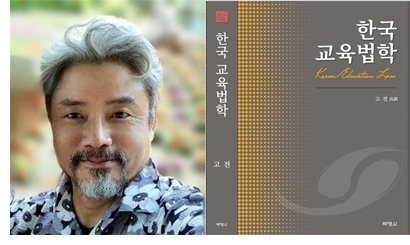JNU Vice-President Ko Jeon published 『Korean Education Law』
· Writer : Jeju National University ·Date : 2022-12-20 00:00:00 ·View : 250
-
noImage
JNU Vice-President Ko Jeon published 『Korean Education Law』

JNU vice-president Ko Jeon (Majoring in Education Law) has published a specialized book on 『Korean Education Law』 (Park Young-sa, 710 pages, KRW 49,000). This book is a compilation of the research results so far on Korean educational methods, which is a specialized book on educational law following vice-president Ko's 『Japanese Education Law』 (2020 Excellent Book of the Korean Academy of Sciences).
The characteristic of this book is that when discussing the Korean education law, it attempted to explain the basic rights of education by combining the constitutional theory of education and the theory of education law of education. This book is also characterized by the aim of ‘Living Education Law’ in that it includes key legislative policies of students, teachers, and schools as well as general matters about the current major education laws, including the ‘Framework Act on Education’, which deals with the explanation of the education law, the review of precedents, and the analysis of legislative policy.
『Korean Education Law』 consists of three chapters and 15 chapters: The General Theory of Basic Education Rights, the Special Theory of Education Law, and the Theory of Legislative Policy.
The first part of the book contains the education law and basic educational rights dealt with the system and history of education law, education law in Germany, the United States, Japan, and Korea, guarantee of basic educational rights, and constitutional trials.
In the second part, he discussed the specifics of education law such as the Education Act, the Basic Education Act, Education Administration and Finance Act, School Education Act, Teacher Act, Teaching Organization Act, Higher Education Act, and Lifelong Education Act. Also, he commented on each of the controversial precedents at issue.
The third part of the book explains the legislative policy theory deals with the legislative policy of protecting students' human rights, the legislative policy of protecting teachers' teaching rights, the policy of ensuring school autonomy. Also, he discussed the tasks of education law and education law, which correspond to the conclusion.
Prof. Ko said, “『Korean Education Law』 will help school teachers and education administrators develop their understanding and analysis of pending educational law issues. And the book is also expected to provide a theoretical and legal basis for graduate master's and doctoral students who want to study educational methods.”












 예비대학생
예비대학생 재학생
재학생 졸업생
졸업생 일반인
일반인 교직원
교직원